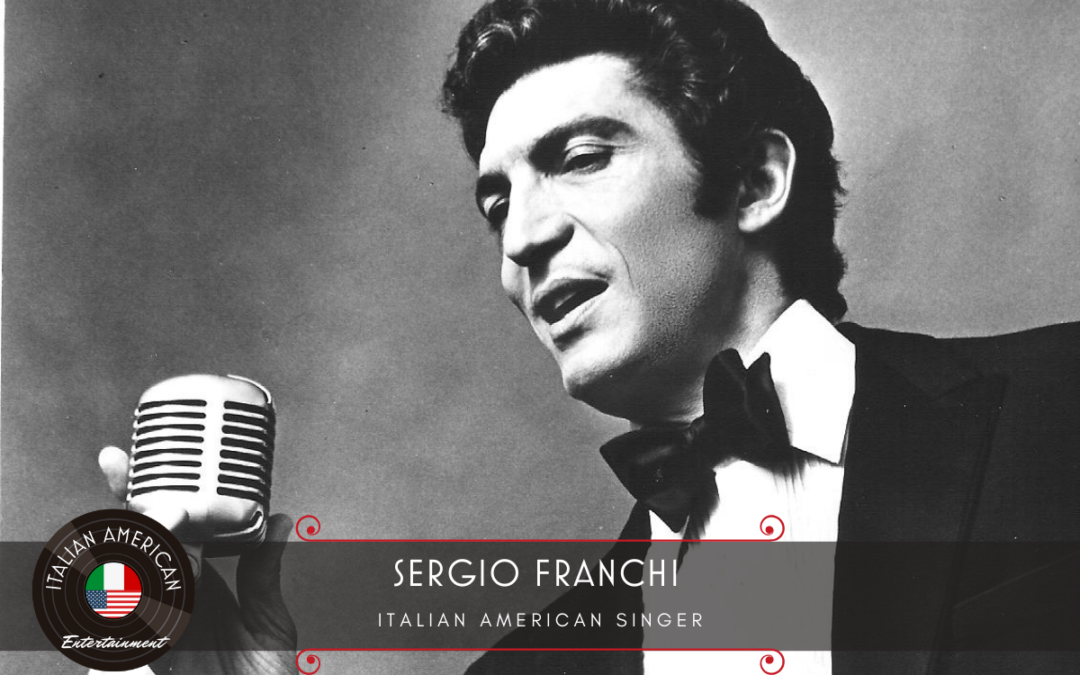Sergio Franci Galli was one of three children born to a Neapolitan father and Ligurian (Genoa) mother. Sergio, Mirella, and Fausta were all born in the Lombardy District. This includes Milan, Cremona, and the smaller village of Codogno – where he was born.
As a child, Franchi sang for the family with his father, who played the piano and guitar. At age ten, he sang a comic role as a hunchback in a school play. Young Franchi formed a three-piece band at age sixteen to earn pocket money, and then later sang with a male vocal group in local jazz clubs. But, in spite of his musical talents, he soon followed his father’s wishes that he pursue a career in engineering. Franchi pursued, but did not finish this training. The senior Galli had been a successful businessman who owned several shops, but lost all of his assets during World War II and the German occupation. After the war, he became friendly with a Captain in the South African medical corps who was stationed nearby. He soon followed the officer’s suggestion that South Africa would be a land of more opportunity, and he immigrated to Johannesburg. The family followed in 1947 when Franchi completed his compulsory military service at age twenty-one.
When the family arrived in Johannesburg, they found that the senior Galli, a skilled wood craftsman, had established a successful furniture factory. Young Franchi began using his skills as an architectural draftsman and worked for his father as a designer of commercial and industrial interiors. He also began singing in informal concerts of Italian music. His voice attracted growing attention. Hearing him sing, one of the principals of the Johannesburg Operatic and Dramatic Society (JODS) tracked him down and offered him the leading role in The Gypsy Baron. (Franchi’s sister Dana Valery played one of the children.) Speaking little English at the time, he learned the role phonetically. Franchi’s debut was well-received, and was soon followed by leading roles in Pink Champagne (Die Fledermaus in English)(1953), The New Moon (1954), and The Vagabond King (1955). Johannesburg’s once-thriving local opera season had collapsed after WWII, and it was not possible at this time to earn a full-time wage as a singer.
Alessandro Rota, a successful operatic tenor in the Southern Hemisphere, came from Cape Town to Johannesburg in 1955 and helped form The National Opera Association. Rota began making a difference by producing operatic concerts, full acts from operas, and then full opera productions. Under Rota’s tutelage, Franchi’s voice matured, and he expanded his vocal range and technique. About his first experience with the fledgling opera company in a production of Carmen, Franchi later stated this initial experience was a disaster: He sang the tenor part in Italian, the baritone sang in Russian, and the soprano sang her role in French. The company quickly matured and Rota placed Franchi in leading tenor roles in at least two successful full opera productions – Puccini’s Madama Butterfly in 1957, and then Verdi’s La traviata in 1959. Some references also list Franchi singing lead performances in Verdi’s Rigoletto and Puccini’s La boheme.
With these experiences, Franchi returned to Italy, aspiring for more opportunities to become an opera singer. While on a performing tour of South Africa, Beniamino Gigli had heard Franchi sing and had encouraged him and his family in this regard. In 1959 Franchi made an important contact with an English agent, James Gilmore, who encouraged Franchi to meet with him if he came to London.
Franchi had some success when he was leaving Italy in 1959, such as being among the 10 finalists in a La Scala competition with 250 other singers. He was also offered the role of Cavaradossi in Tosca, which he played in a minor opera house. Looking back in 1983 about hoping to make it in Italian opera, Franchi stated that he didn’t think he was in his right mind: “I was a dreamer.” At the time he believed he was doing well, so he sent for his wife and children. However employment opportunities ceased, and within a year Franchi was broke.
Franchi then looked for work in Italy while his wife and children remained in South Africa. He began recording with Durium Records for the popular market, having hits with “more mio” and “I tuoi occhi verde.” An album of Italian songs and several EPs and singles in Italy, London, and Canada followed (these recordings were eventually released for American audiences.) As a result of his personal appearances and recordings, Franchi began drawing enough attention to become tracked on Billboard. In early 1960, Franchi played the role of Janni in the short-lived London production of The Golden Touch. His singing performance received favorable reviews. His London agent, James Gilmore, arranged several TV appearances for Franchi, and that work (and political changes in South Africa) allowed him to return to his family in London.
Franchi arrived in New York on September 25, 1962. RCA Victor had begun a heavy promotional campaign to launch his American career, concurrent with the release of his debut album. Franchi made his American television debut with an appearance on The Ed Sullivan Show on October 14, 1962; and his Sol Hurok concert debut at Carnegie Hall on October 21, 1962. Singing the full length of the concert without a microphone, a New York reviewer commented on Franchi’s “big, healthy voice”, his penchant for ad-libbing, and his ability to establish instant rapport with his audience.
Ed Sullivan was in the audience that night and soon contracted for future Franchi appearances—including a second TV appearance on his show the following week (October 28, 1962). Franchi would later become one of Sullivan’s “two or three most favorite guests,”, and appeared 24 times. Sales for the debut record did well, peaking on the Billboard 200 at number 17 at the end of December. The year was concluded with successful concert appearances in Washington, D.C.’s Constitution Hall and in Boston’s Music Hall
He soon made his Las Vegas debut at the Sahara Hotel as the opening act for Bob Newhart. These successful performances were interspersed with multiple European events. Franchi recorded three more albums for RCA Victor (see discography), all three of which peaked on the Billboard 200 pop charts in 1963. His debut album, Romantic Italian Songs continued on the Billboard 200; He completed the year as the opening act for Juliet Prowse at the Cocoanut Grove.
1964 was a significant year for Franchi for professional and personal reasons. In a move to attract more mainstream pop audiences, RCA Victor switched Franchi from the Red Seal label to their standard black pop label. He also changed his professional representation to the William Morris Agency. Although he had already received offers to star in several films, Franchi did not find a role he wished to play for a few more years. Franchi then moved his family from London to a Park Avenue apartment in New York City. He also filed the first papers in declaration of his intent to become an American citizen, among other endeavors.
Franchi was always attracted to the arts, and could play multiple instruments, including piano and guitar. Franchi also always carried a sketch book with him on all of his travels, and in later life, devoted himself to watercolor painting in his private studio.
His last of more than 130 television appearances was on Live! with Regis & Kathie Lee on July 4, 1989 and Franchi’s last concert was at the Warwick Musical Theater on Saturday, July 29, 1989. On August 3, 1989, while rehearsing for a South Shore Music Circus concert the next day (with Pat Cooper), Franchi collapsed, was hospitalized, and the rest of his summer concerts were cancelled. Tests revealed a brain tumor and, despite radiation therapy, Franchi succumbed to the illness. He died less than one month after his 64th birthday.

